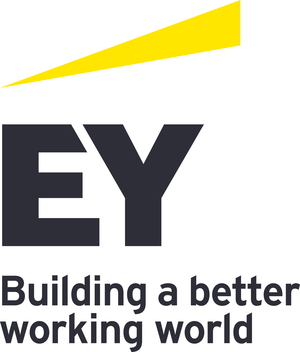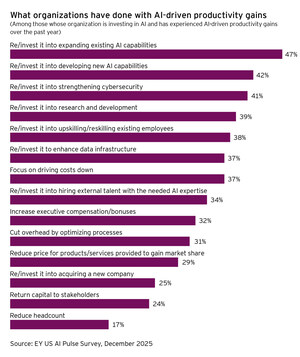
Employer positions on social issues impact Gen Z and millennials' intent to stay; flexibility, a desire across generations, tops baby boomers' wish list when looking for new position
NEW YORK, Oct. 13, 2022 /PRNewswire/ -- Maintaining workplace culture across in-person, remote and hybrid teams is top of mind for many organizations. However, how culture is defined and what is needed to feel supported varies across the four generations in the workplace – Gen Z, millennials, Gen X and baby boomers – and across various dimensions of diversity. The 2022 EY US Generation Survey of 3,000 full-time white-collar workers at organizations with 5,000 employees or more looked at the preferences of the current workforce and revealed the importance of company culture; diversity, equity and inclusion (DEI) initiatives; and flexibility.
"Employee expectations have shifted over the course of the last 2.5 years and so have the ways people want to feel valued. They're looking to be supported both professionally and personally," said Leslie Patterson, EY Americas and US Diversity, Equity and Inclusiveness Leader. "All four generations in today's workforce value different programs, policies and benefits, presenting challenges and opportunities for organizations that are looking to attract and retain top talent."
Valuable role of corporate culture
Corporate culture, including DEI initiatives, positions on social issues and workplace flexibility, is a top factor when it comes to retaining and attracting talent. In fact, 92% of employees surveyed ― across all four workplace generations ― said that culture has an impact on their decision to remain with an employer.
Baby boomers, however, tend to care less about culture: 29% said it has only a little, or no impact at all, on their intent to stay with an employer. That's strikingly different from younger workers (Gen Z and millennials), who said culture has "a great deal" of impact on their intent to stay at their current place of employment, at 39% each.
"Company culture is largely centered around how someone feels – whether they feel valued, supported and like they belong. It manifests itself in different ways across the generations and dimensions of diversity," added Patterson. "Culture isn't static. Organizations need to regularly take a pulse check as to whether they are continuing to align with the workplace desires and expectations of their people."
Diversity, equity and inclusion efforts matter
The efforts of organizations to drive progress around DEI have not gone unnoticed. Three-quarters (75%) of workers, across generations, said their company's commitment to DEI is authentic. And DEI is of particular importance to millennials. According to the survey, 76% said they'd leave an employer if DEI initiatives weren't offered.
The 2022 EY US Generation Survey did, however, uncover a disconnect in how workers define DEI. Gen Z workers reported they associate DEI with a commitment to community support through corporate responsibility efforts and volunteering (44%) and establishment of employee resource groups (34%). Black respondents saw – significantly more than white respondents – DEI as a company's investment in the development and advancement of underrepresented populations at work (57% vs. 46%, respectively). Also, LGBT+ respondents – more than heterosexual respondents – said that DEI equates to a culture that focuses on belonging (53% vs. 47%, respectively).
"The demand from stakeholders for DEI transparency, accountability toward progress and measurement continues. But these expectations around DEI vary by each demographic and generation in the workplace," said Patterson.
Overall, a majority of survey respondents (59%) said DEI means "equitable job opportunities," and 57% indicated that they believe it means the people they work with and who are in leadership roles represent diverse backgrounds and experiences.
Positions on social issues impact retention
With social issues regularly dominating the headlines in the US, it's hardly surprising that 36% of employees say their company's positions on these issues impact their decision to stay at their current employer. A deeper dive into that data showed some distinctive differences. Almost half (49%) of the younger workforce (millennials and Gen Z) and LBGT+ workers (49%) said corporate positions on social issues played a significant impact on their decision to stay with an employer.
Also, nearly 3 in 10 (29%) millennials said they are planning to leave their company within a year because their company doesn't match their values. "This further underscores the need for companies to stay attuned to the expectations of their people and the need to continue evolving their culture. If they don't, there's a risk of future leaders looking elsewhere," added Patterson.
Flexibility as a workplace must
While competitive pay and benefits are unsurprisingly the top two factors in respondents' decisions to apply for a new position, hybrid work/work-from-home options are the third most important, edging over career advancement opportunities that originally attracted workers to their current companies.
The 2022 EY US Generation Survey also uncovered the importance of flexibility to baby boomer workers. A third (33%) said flexibility in where and when they work is a top factor in looking for a new position, more than any other generation.
In addition, 35% of millennials and 29% of Gen X respondents who intend to leave their job in the next year said hybrid/work-from-home options would entice them to stay.
"Companies today have an opportunity to reimagine who they are and how they operate," said Ginnie Carlier, EY Americas Vice Chair – Talent. "The pandemic showed that productivity didn't falter when we worked from home and instead, providing people with flexibility in where and how they work can help cultivate a culture where all can thrive. As we navigate a tight labor market, companies that embrace flexibility will rise to the top and attract and retain top talent."
2022 EY US Generation Survey methodology
Ernst & Young LLP surveyed 3,000 Americans between the ages of 18 and 76 who are employed full-time in a "white-collar" role at an organization with 5,000 employees or more. The survey was fielded using the Qualtrics Insight Platform, and the panel was sourced from Lucid. Fielding was executed August 29, 2022, through September 16, 2022.
About EY
EY exists to build a better working world, helping create long-term value for clients, people and society and build trust in the capital markets.
Enabled by data and technology, diverse EY teams in over 150 countries provide trust through assurance and help clients grow, transform and operate.
Working across assurance, consulting, law, strategy, tax and transactions, EY teams ask better questions to find new answers for the complex issues facing our world today.
EY refers to the global organization, and may refer to one or more, of the member firms of Ernst & Young Global Limited, each of which is a separate legal entity. Ernst & Young Global Limited, a UK company limited by guarantee, does not provide services to clients. Information about how EY collects and uses personal data and a description of the rights individuals have under data protection legislation are available via ey.com/privacy. EY member firms do not practice law where prohibited by local laws. For more information about our organization, please visit ey.com.
SOURCE EY







Share this article